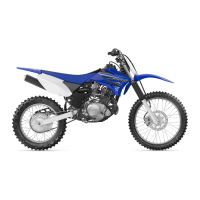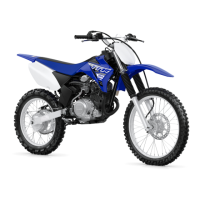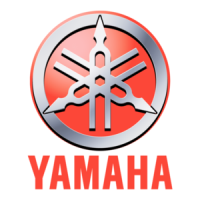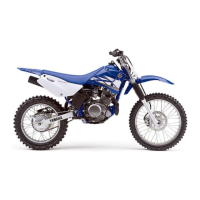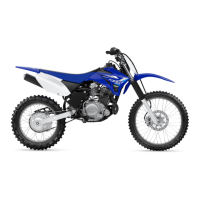Do you have a question about the Yamaha TT-R125EY and is the answer not in the manual?
Provides essential safety and operational guidelines for using the manual.
Information on how to contact Yamaha for warranty service and support.
Instructions for warranty registration updates and notifying Yamaha of address changes.
Guidance on navigating the manual to locate specific sections and information efficiently.
Explanation of the manual's structure, including exploded diagrams and job instruction charts.
Details on locating and identifying the machine's serial and model numbers for parts ordering and security.
General advice on preparation for disassembly, replacement parts, and handling components during service.
Procedures for inspecting and cleaning electrical connectors to ensure proper system function.
List of specialized tools required for specific maintenance and repair tasks, with part numbers.
Key dimensions, weight, and engine specifications for the TT-R125E model.
Key dimensions, weight, and engine specifications for the TT-R125LE model.
Detailed technical standards and limits for engine components, including dimensions and clearances.
Specific torque values for various engine fasteners to ensure proper assembly and prevent damage.
Technical specifications and limits for chassis components, including suspension and wheels for TT-R125E.
Standard torque specifications for common fasteners based on thread size and type.
Glossary of units of measurement and their definitions used throughout the manual.
Illustrates the proper routing and securing of electrical wiring and cables on the motorcycle chassis.
Technical specifications and limits for chassis components, including suspension and wheels for TT-R125LE.
Specific torque values for chassis fasteners, covering suspension and frame components.
Specifications for electrical system components, including resistance and voltage values.
Specific torque values for electrical system fasteners, covering components like the starter motor and CDI magneto.
Scheduled maintenance intervals for emission control system components based on time and mileage.
Periodic maintenance schedule and lubrication points for overall machine upkeep.
Comprehensive list of maintenance intervals for steering, brakes, suspension, and battery systems.
Essential checks and maintenance procedures to perform before riding the machine.
Steps for checking and adjusting the clutch lever free play to ensure proper operation.
Procedures for checking and adjusting the throttle grip free play for smooth throttle response.
Instructions for lubricating the throttle cable and grip assembly for optimal performance.
Detailed steps for removing, cleaning, and inspecting the air filter element to prevent engine wear.
Method for checking engine oil level using the dipstick and recommended oil types.
Step-by-step instructions for draining and refilling the engine oil, including torque specifications.
Procedure for checking engine oil pressure to ensure adequate lubrication.
Steps for adjusting the engine's idle speed using a tachometer and throttle stop screw.
Procedures for checking and adjusting valve clearance when the engine is cool.
Instructions for removing, cleaning, and reinstalling the spark arrester to maintain exhaust system efficiency.
Steps for bleeding the brake system to remove air and ensure proper braking performance on the TT-R125LE.
Procedure for adjusting the front brake lever free play for optimal braking control.
Steps for adjusting the rear brake pedal free play to ensure correct brake engagement.
Procedure for adjusting the height of the brake pedal for rider comfort and control.
Guide to inspecting front brake pad thickness and replacing them when worn on the TT-R125LE.
Method for inspecting the wear limit of front brake shoes on the TT-R125E model.
Procedure for inspecting the wear limit of rear brake shoes.
Steps for checking and maintaining the brake fluid level in the master cylinder for the TT-R125LE.
Inspection of sprocket teeth for wear and damage, recommending replacement as a set.
Procedures for cleaning, measuring, and checking the drive chain for wear and stiffness.
Steps for adjusting the drive chain slack to the specified range for optimal performance.
Checks for smooth action and oil leaks in the front fork assembly.
Adjusting the front fork spring preload to modify suspension stiffness on the TT-R125LE.
Inspection of the rear shock absorber for smooth action, noise, and damage.
Adjusting the rear shock absorber spring preload to change suspension stiffness.
Adjusting the rebound damping force of the rear shock absorber on the TT-R125LE.
Adjusting the compression damping force of the rear shock absorber on the TT-R125LE.
Procedure for measuring and adjusting tire pressure to the recommended standard.
Inspecting spokes for looseness and retightening them for wheel integrity.
Checks for wheel runout to ensure proper alignment and smooth rotation.
Procedures for inspecting and adjusting steering head bearing play and smooth operation.
Guide to lubricating various moving parts and cables for smooth operation and longevity.
Steps for inspecting the spark plug condition, gap, and cleaning or replacing it.
Procedures for inspecting battery charge state, charging methods, and safety precautions.
Steps for checking fuse continuity and replacing blown fuses to troubleshoot electrical issues.
Instructions for removing the seat, fuel tank, and side covers for engine access.
Steps for removing and reinstalling the exhaust muffler and spark arrester.
Detailed procedures for carburetor removal, disassembly, inspection, and installation.
Steps for removing the cylinder head side cover and tappet covers for valve inspection access.
Procedure for removing the cylinder head assembly, including timing chain and camshaft sprocket.
Specific points and checks required during cylinder head removal, including timing marks alignment.
Procedures for inspecting the cylinder head for carbon deposits, scratches, and warpage.
Steps for installing the cylinder head, including gasket, bolts, and timing marks alignment.
Procedures for removing, inspecting, and installing the camshaft and rocker arms.
Steps for removing valves, springs, retainers, and seals from the cylinder head.
Procedures for installing valves, springs, seats, and seals, ensuring correct orientation.
Steps for removing the cylinder, piston, and related components.
Procedures for inspecting cylinder walls, piston, and piston rings for wear and damage.
Measuring cylinder bore, taper, roundness, piston skirt diameter, and calculating clearance.
Steps for installing piston rings, piston, and piston pin with proper lubrication and alignment.
Procedures for removing clutch plates and friction plates from the clutch assembly.
Steps for removing the primary driven gear, including the clutch boss and lock washer.
Procedure for removing the clutch push lever assembly.
Key points and tools for removing the clutch boss and primary drive gear.
Inspection of clutch housing, boss, and primary driven gear for wear or damage.
Measuring clutch spring free length to determine if replacement is needed.
Measuring friction plate thickness at multiple points to check for wear.
Measuring clutch plate warpage to ensure it is within the specified limit.
Inspecting the push lever for wear or damage and recommending replacement if necessary.
Steps for installing the push lever, including lubrication and alignment.
Procedures for installing the primary drive gear, washer, and nut with correct torque.
Steps for assembling the clutch components, including plates, springs, and pressure plate.
Procedure for removing the oil pump assembly, including the rotary filter and drive gear.
Steps for disassembling the oil pump, including rotors, shaft, and housing.
Inspecting oil pump components for tip, side, and housing-to-rotor clearance.
Procedures for assembling and installing the oil pump, including rotors, shaft, and housing.
Steps for removing the kick axle assembly and shift shaft components.
Key points and tools for removing the kick axle and segment components.
Checks for smooth movement of the ratchet wheel and inspection of the kick axle.
Inspection of kickstarter segment gear and kick idle gear teeth for wear.
Measuring the friction force of the kick axle clip to ensure proper spring tension.
Steps for installing the segment and its retaining screw with correct alignment and torque.
Procedures for installing the stopper lever and its associated bolt and torsion spring.
Steps for installing the shift shaft with proper lubrication and spring end engagement.
Procedures for installing the kick axle assembly, including gears, washers, and springs.
Steps for installing the kick idle gear onto the kick axle with proper lubrication and orientation.
Procedures for removing the CDI magneto, stator, starter clutch, and related components.
Key points and tools for removing the rotor and CDI magneto assembly.
Inspection of the CDI magneto's rotor inner surface and stator outer surface for damage.
Inspection of the Woodruff key for damage and recommendation for replacement if necessary.
Checks for starter clutch and idle gear condition, wear, and damage.
Checks for starter clutch operation, including engagement and free rotation.
Procedures for installing the stator, pickup coil, starter idle gear, and related components.
Step-by-step guide for removing the engine from the motorcycle chassis.
Procedures for installing the engine back into the motorcycle frame with correct mounting bolts.
Steps for removing the crankcase halves, crankshaft, and balancer assembly.
Key points and precautions for separating the crankcase halves using specialized tools.
Procedure for removing the crankshaft from the crankcase using a separating tool.
Inspection of the timing chain and guide for cracks, stiffness, wear, or damage.
Inspection of crankcase contacting surfaces and mounting bosses for scratches or damage.
Inspecting bearings for smooth rotation and checking for rough spots or seizure.
Measuring crankshaft runout, connecting rod big end side clearance, and crank width.
Inspection of the balancer for cracks or damage, recommending replacement if needed.
Steps for installing bearings into the crankcase and crankshaft assembly.
Procedures for installing the crankshaft using specialized tools and ensuring proper alignment.
Steps for assembling the crankcase halves, including applying sealant and installing dowel pins.
Procedures for removing the transmission components, including shift forks, cams, and axles.
Key points for removing the transmission main and drive axles, emphasizing careful handling.
Inspection of gear teeth and grooves for wear or damage, and checking gear movement.
Inspection of the push rod for wear, damage, or bending.
Inspecting bearings for smooth rotation and checking for rough spots or seizure.
Inspection of shift forks and shift cam for wear, bends, or damage.
Procedures for installing transmission gears onto the main and drive axles with proper lubrication.
Steps for installing shift forks, guide bars, and the shift cam with correct meshing and lubrication.
Procedure for removing the front wheel and drum brake assembly on the TT-R125E.
Exploded view and part listing for the front wheel and drum brake of the TT-R125E.
Key points for removing and servicing the front wheel bearing.
Checks for wheel runout and inspecting wheel bearings for smooth operation.
Measuring the wheel axle for bends and ensuring it is within the specified limit.
Inspecting the brake shoe lining surface, thickness, and drum inside diameter for wear.
Steps for assembling and installing the front brake shoe plate, including camshaft and wear indicator.
Procedures for installing the front wheel, bearings, seals, and brake disc.
Final assembly steps for the front wheel, brake disc, and axle installation.
Procedure for removing the front wheel assembly on the TT-R125LE model.
Key points for removing and inspecting the front wheel bearing.
Checks for wheel runout and bearing condition for the TT-R125LE.
Measuring the wheel axle for bends on the TT-R125LE.
Inspecting the front brake disc for deflection and thickness wear on the TT-R125LE.
Steps for installing the front wheel, brake disc, and axle on the TT-R125LE.
Procedure for removing the front brake system components on the TT-R125LE.
Disassembly procedures for the front brake caliper and master cylinder on the TT-R125LE.
Key points for draining the brake fluid and removing the brake caliper piston.
Steps for removing the brake caliper from its bracket.
Procedure for removing the brake caliper piston using compressed air.
Inspection of the brake master cylinder's inner surface, diaphragm, and piston for wear or damage.
Removing and replacing brake caliper piston seals and dust seals on the TT-R125LE.
Inspecting the brake caliper cylinder, piston, bracket, guide pin, and boots for wear or damage.
Inspecting the brake hose for cracks or damage, recommending replacement if necessary.
Steps for cleaning and installing the brake caliper piston, seals, and dust seals.
Procedures for installing the brake caliper onto its bracket with proper lubrication.
Steps for installing the brake caliper bracket, pads, and caliper.
Procedures for installing the front brake hose, including union bolt and cable guide.
Steps for filling the brake fluid reservoir and bleeding the brake system.
Final installation steps for the front brake master cylinder cap and screws.
Procedure for removing the rear wheel, including brake components and drive chain.
Exploded view and part listing for the rear wheel and drum brake assembly.
Key points for removing the rear wheel and inspecting wheel bearings.
Checks for rear wheel runout and bearing condition.
Measuring the rear wheel axle for bends.
Inspecting the rear drum brake shoes, lining thickness, and drum diameter for wear.
Steps for assembling and installing the rear brake shoe plate, camshaft, and lever.
Procedures for installing the rear wheel, bearings, seals, and sprocket.
Final assembly steps for the rear wheel, including sprocket, collars, and drive chain.
Procedure for removing the front fork assembly from the motorcycle.
Steps for disassembling the front fork, including dust boots, seals, and damper rods.
Key points for removing the front fork cap bolt.
Steps for removing the inner tube, dust seal, and stopper ring.
Procedures for removing the damper rod, inner tube, and oil flow stopper.
Inspection of the damper rod for bends or damage.
Measuring the free length of the front fork spring to check for wear.
Inspection of the inner tube surface, bends, and piston metal for wear or damage.
Steps for washing and assembling the front fork components, including piston, damper rod, and inner tube.
Procedure for removing the handlebar, including controls and levers.
Disassembly of the throttle grip assembly, including grip, collar, and tube guide.
Key points for removing the brake master cylinder bracket and cylinder.
Method for removing the handlebar grip, typically by inflating with air.
Inspection of the handlebar for bends, cracks, or damage, recommending replacement if necessary.
Steps for installing the handlebar, holders, switches, and bolts with correct torque.
Procedures for removing the steering stem, brackets, nuts, and bearings.
Key points for removing the steering ring nut using a specialized wrench.
Procedure for removing bearing races from the steering head.
Method for removing the lower steering bearing using a floor chisel.
Inspecting the steering stem for bends or damage.
Inspecting steering bearings and races for pitting, damage, or smooth operation.
Steps for installing the lower bracket, including bearings and grease.
Procedures for installing the upper bracket, steering stem nut, and starter knob.
Procedure for removing the swingarm, including tensioners and pivot shaft.
Steps for disassembling the swingarm, including chain guards, collars, and bushings.
Inspecting swingarm bushings, dust covers, and the swingarm itself for wear or damage.
Inspecting the relay arm, collars, bushings, and oil seals for wear or damage.
Procedures for pressing in and installing bushings for the swingarm and connecting arm.
Steps for installing the swingarm assembly, including pivot shaft and nuts.
Procedures for installing the connecting arm, drive chain components, and swingarm.
Procedure for removing the rear shock absorber assembly from the motorcycle.
Important safety and handling instructions for the high-pressure nitrogen gas rear shock absorber.
Inspection of the rear shock absorber damper rod, body, spring, and gas seals for damage or leaks.
Guidelines for safely releasing gas pressure from shock absorbers before disposal.
Method for removing bushings by pressing them out.
Steps for pressing in and installing bushings for the rear shock absorber.
Procedures for installing the rear shock absorber assembly onto the motorcycle frame.
Identifies electrical components and illustrates the motorcycle's wiring diagram with color codes.
Diagnostic steps for troubleshooting ignition system failures, including spark gap tests.
Procedure for testing ignition spark using a dynamic spark tester and checking the spark gap.
Checks for proper connection, rust, dust, or looseness in electrical couplers and leads.
Testing the continuity of the main switch in different positions using a tester.
Inspection of the engine stop switch continuity in both pushed and free states.
Measuring the primary coil resistance of the ignition coil to check for proper function.
Measuring the secondary coil resistance of the ignition coil, requiring spark plug cap removal.
Inspecting the pickup coil resistance of the CDI magneto for proper specifications.
Measuring the source coil resistance of the CDI magneto to check for proper output.
Explanation of how the starting circuit cut-off system prevents starter motor operation under specific conditions.
Diagnostic steps for troubleshooting the electric starting system when the starter motor fails to operate.
Procedure for testing the starter motor operation using a jumper lead and battery.
Inspecting the starting circuit cut-off relay's conduct using a 12V battery and tester.
Inspecting the starter relay's conduct using a 12V battery and tester.
Inspection of the neutral switch continuity in neutral and in-gear positions.
Testing the continuity of the clutch switch in both pulled and free positions.
Testing the continuity of the start switch in both pushed and free positions.
Procedure for removing the starter motor assembly.
Steps for disassembling the starter motor, including brushes, armature, and covers.
Procedures for inspecting and repairing the starter motor, including commutator, brush length, and armature resistance.
Diagnostic steps for troubleshooting the charging system when the battery is not charging.
Checks for proper connection and condition of electrical couplers and leads in the charging system.
Procedure for inspecting the charging system's output voltage at different engine speeds.
| Displacement | 124 cc |
|---|---|
| Bore x Stroke | 54.0 mm x 54.0 mm |
| Compression Ratio | 10.0:1 |
| Ignition System | CDI |
| Final Drive | Chain |
| Front Suspension | telescopic fork |
| Rear Brake | Drum |
| Front Tire | 70/100-19 |
| Fuel Capacity | 1.6 gal |
| Engine Type | 4-stroke, SOHC, 2-valve |
| Fuel System | Mikuni VM20 carburetor |
| Transmission | 5-speed |
| Rear Suspension | Monoshock |
| Rear Suspension Travel | 6.3 in (160mm) |
| Seat Height | 31.7 in (805mm) |
| Wet Weight | 194 lb (88kg) |
| Width | 31.3 in (795mm) |
| Curb Weight | 194 lb (88kg) |
